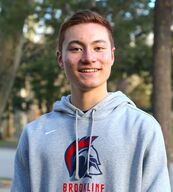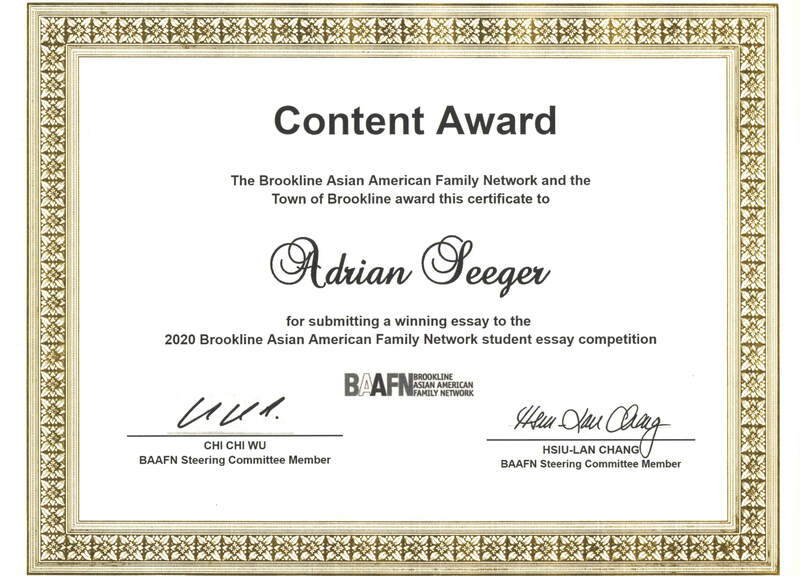2020 BAAFN Content Award
A Gong
by Adrian Seeger
After watching Grave of the Fireflies, a heart-wrenching animated film that follows the story of a boy and his younger sister struggling to survive in Japan during the final months of World War II, my mother made sure that I understood the moral of the story. "Nobody wins in a war," she told me. Only recently have I been able to reflect on how exactly this history fits into my own family.
I am a bi-racial Asian-American, my mother was born and raised in Taiwan, while my Caucasian father was born and raised in America. For me, the most challenging aspect of being Asian-American has been seeking knowledge of my roots in Taiwan. When I was younger, I only looked forward to eating soup dumplings, snacking on guava and going to toy stores during trips to the island. In contrast, my recent trips have been accentuated by tours of historical sites and museums, all in an effort to gain insight into the triumphs and perils of my mother's native homeland.
In recent years, I have been particularly inspired by the stories of my grandfather who I know by the Taiwanese term agong. Born in Taipei in 1934, he grew up in a Japanese-governed Taiwan. The son of Japanese citizens, he spent his elementary school years learning the Japanese language and culture. He was eleven years old when the World War II came to its dramatic conclusion, turning his life upside down and forcing him to reassimilate into Taiwanese society by attending a Mandarin school. My agong has repeatedly told me that violent conflicts never have true victors; all countries involved come away emptier than before.
In recent years, I have pondered the life story of my agong and derived sense from it to help make sense of my own life. When I decided to study basic Chinese instead of advanced French in high school, I often thought of my agong and the humiliation he must have felt struggling to learn Mandarin rendered him a stranger in his native land. For me, being at the top of my Chinese class is never enough; I also wish to transcend barriers established by geography, politics, and culture.
Whenever I visit Taiwan, reminders of the story of my agong are everywhere. For example, I often go for runs along the Tamsui River in Taipei, where he would often go fishing during the war as a means for providing for his family. As I run I picture him as he once was, perched on a rocky riverbank while American bomber buzzed ominously above him. I have also visited the Beitou district of Taipei; once a mountainous refuge for my agong during Allied bombing raids, it has now become a prime tourist destination for its hot springs.
Now that stories such as his are no longer a mystery to me, my quest to draw from my family's past has taken on a new sense of urgency. After my sophomore year of high school, my family and traveled to Taiwan and Japan. In a hallway of a hotel in Tokyo, I was pushing my agong in a wheelchair to his hotel room while he spoke animatedly of trivial matters. Suddenly, he paused and said to me, "Adrian, this may be one of the last times left to see you." The smile I had on on my face instantly fell, and I wanted to stop the wheelchair in its tracks and chastise him for saying such a thing. This was not the kind of language I wanted to hear, especially given that my mother was still battling breast cancer at the time. But I kept going, only quickening my pace a little bit and strengthening my grip on the wheelchair handles.
Later on the trip, I met up with a Japanese friend who used to study at Brookline High School. The highlight of our day together was listening to my agong tell his story to someone new with my family close by. In the background, massive windows afforded us a panoramic view of the skyline of Tokyo, a city that had risen from the ashes of the past and become an orderly, skyscraper-studded metropolis.
It was then that I realized how my mixed heritage has enriched my worldview and made me privy to the true meanings of war and peace. As an Asian-American, I must recognize my past, embrace the future, and then carry my heritage boldly into the highly dynamic American society I call home.
I am a bi-racial Asian-American, my mother was born and raised in Taiwan, while my Caucasian father was born and raised in America. For me, the most challenging aspect of being Asian-American has been seeking knowledge of my roots in Taiwan. When I was younger, I only looked forward to eating soup dumplings, snacking on guava and going to toy stores during trips to the island. In contrast, my recent trips have been accentuated by tours of historical sites and museums, all in an effort to gain insight into the triumphs and perils of my mother's native homeland.
In recent years, I have been particularly inspired by the stories of my grandfather who I know by the Taiwanese term agong. Born in Taipei in 1934, he grew up in a Japanese-governed Taiwan. The son of Japanese citizens, he spent his elementary school years learning the Japanese language and culture. He was eleven years old when the World War II came to its dramatic conclusion, turning his life upside down and forcing him to reassimilate into Taiwanese society by attending a Mandarin school. My agong has repeatedly told me that violent conflicts never have true victors; all countries involved come away emptier than before.
In recent years, I have pondered the life story of my agong and derived sense from it to help make sense of my own life. When I decided to study basic Chinese instead of advanced French in high school, I often thought of my agong and the humiliation he must have felt struggling to learn Mandarin rendered him a stranger in his native land. For me, being at the top of my Chinese class is never enough; I also wish to transcend barriers established by geography, politics, and culture.
Whenever I visit Taiwan, reminders of the story of my agong are everywhere. For example, I often go for runs along the Tamsui River in Taipei, where he would often go fishing during the war as a means for providing for his family. As I run I picture him as he once was, perched on a rocky riverbank while American bomber buzzed ominously above him. I have also visited the Beitou district of Taipei; once a mountainous refuge for my agong during Allied bombing raids, it has now become a prime tourist destination for its hot springs.
Now that stories such as his are no longer a mystery to me, my quest to draw from my family's past has taken on a new sense of urgency. After my sophomore year of high school, my family and traveled to Taiwan and Japan. In a hallway of a hotel in Tokyo, I was pushing my agong in a wheelchair to his hotel room while he spoke animatedly of trivial matters. Suddenly, he paused and said to me, "Adrian, this may be one of the last times left to see you." The smile I had on on my face instantly fell, and I wanted to stop the wheelchair in its tracks and chastise him for saying such a thing. This was not the kind of language I wanted to hear, especially given that my mother was still battling breast cancer at the time. But I kept going, only quickening my pace a little bit and strengthening my grip on the wheelchair handles.
Later on the trip, I met up with a Japanese friend who used to study at Brookline High School. The highlight of our day together was listening to my agong tell his story to someone new with my family close by. In the background, massive windows afforded us a panoramic view of the skyline of Tokyo, a city that had risen from the ashes of the past and become an orderly, skyscraper-studded metropolis.
It was then that I realized how my mixed heritage has enriched my worldview and made me privy to the true meanings of war and peace. As an Asian-American, I must recognize my past, embrace the future, and then carry my heritage boldly into the highly dynamic American society I call home.



